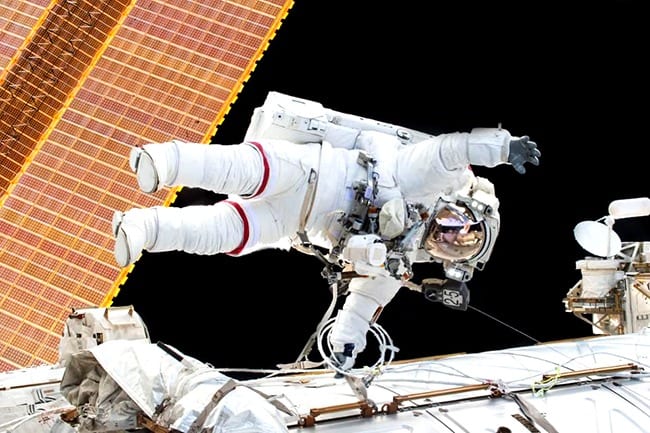Editor: Philip Ragner | Tactical Investor
Why astronauts lose weight in space
The International Space Station is a massive orbiting science project, where technologies and ideas are tested in microgravity. In the huge structure free-falling around Earth, astronauts grow lettuce, test 3D printers, and explore augmented reality (in between running marathons and otherwise entertaining us all). But the astronauts themselves aren’t just scientists or engineers. In many ways, they also test subjects for researchers here on the ground, who are eager to learn more about what happens to bodies in space.
“The short answer is, we don’t know much about that,” Smith says. He explains that NASA has constraints when it comes to what they decide to study, limits in both time and their subjects, so the people who prioritize nutritional studies tend to focus on high-risk aspects of nutrition.
So Why astronauts lose weight in space
“As odd as it sounds, that’s one of the bigger challenges we have; getting crews to eat enough calories to maintain body weight,” Smith says. Weight maintenance while in space has been a challenge for astronauts for decades, and in fact, used to be considered an unavoidable side-effect.
“I think it’s that food doesn’t settle the same way it does on Earth, so that the stretching of your stomach—which sends the signal to your brain to say ‘you’re full, stop eating’—I think that gets triggered faster in weightlessness than it does on Earth,” Smith says.
if you look historically at exploration on Earth we learned a lot about nutrition the hard way—sailors getting scurvy is one key example,” Smith says. We may not yet know the exact effects of long term spaceflight on an astronaut’s body, but we do know that fresh veggies (and healthy fats) are crucial to their wellbeing. Read more
Exercise is the number one health priority in space
Said Don Hagan, director of exercise physiology at Johnson Space Center. “No other activity except eating and sleeping is given that much priority. Two and a half hours each day are devoted to fitness.”
Why is it so important for astronauts to exercise while they’re in space? If astronauts don’t exercise, their bodies start losing bone and muscle and that is why astronauts lose weight in space. Bone and muscle loss means decreased size and strength and can reduce an astronaut’s ability to do work because it makes them weak.
In microgravity, body fluids are moved around. Fluids such as plasma are lost throughout the body. Plasma is where red blood cells live. Less plasma means there is less blood to carry oxygen to the rest of the body. Exercise, however, has been shown to increase the amount of plasma in the body. Astronauts who exercise make more red blood cells.
Microgravity also brings about another change in something called “orthostatic intolerance,” Hagan said. “When you lie down, stand up quickly, and feel light-headed, that’s orthostatic intolerance,” he said. “Your body tries to stop this from happening. It does so by increasing its heart rate and blood pressure to keep more blood returning to your heart. If you can’t do that, you’ll pass out. With no gravity and less blood volume, astronauts are more prone to fainting. Again, exercise can help increase blood volume and circulation. That helps prevent fainting.
Russians and Americans have different exercise routines on the Space Station. But they all have the same goal: keeping the astronauts and cosmonauts healthy. Read more
What Did A Year In Space Do To Scott Kelly?
NASA embarked on its very own astronaut twin experiment. Scott Kelly shot up to the International Space Station while his identical-except-for-the-moustache twin, retired astronaut Mark Kelly1, stayed firmly planted on Earth.
Now on March 1, after 340 days in orbit, Kelly-the-space-bound is coming home. Riding inside the snug Soyuz back with him will be fellow year-in-space resident, cosmonaut Mikhail Korniyenko.
But back to the twins (sorry, Mikhail), because that’s one of the most exciting parts of this year-in-space adventure. While Kelly-the-Earthbound wasn’t spending time munching space lettuce or drinking space coffee or doing important astronaut stuff, he was collecting blood, urine, saliva, and poop—for science! At the same time, NASA has been taking samples from his identical twin. By comparing the data, scientists hope to get a better handle on what happens to human bodies in space.
Without gravity, for example, the heart shrinks because it no longer has to work as hard to pump blood to the legs and back. It also accounts for the Charlie Brown effect, where fluids in the face make astronauts more round-cheeked than they typically are on Earth.
This makes it harder to smell food, but more seriously, also harder to see.
When Scott Kelly touches down on Earth, most of the data collecting part of the twin study will be over. But analyzing the data will have only just begun. Read more
Other Articles of Interest
Stock Market Insanity Trend is Gathering Momentum (Jan 10)
Is value investing Dead (Jan 9)
Irrational markets and Foolish Investor: perfect recipe for disaster (Jan 5)
Stock market Crash Myths and Realities (Jan 3)
Bull-Bear Markets & Arrogance (Jan 1)
Will The Stock Market Crash In 2018 (Dec 11)
Has US Dollar Finally Hit Bottom (Dec 6)
BitCoin Has Done What Precious Metals Never Could (Dec 4)
Experts Making Stock Market Crash Forecasts usually know nothing (Nov 17)
1987 stock market crash anniversary discussions- nothing but rubbish ( Oct 24)
Dow 22K Predicted In July 2017; Next Target Dow 30k? (Oct 15)
Anxiety and Greed Index Don’t Support Stock Market Crash (Oct 14)
Fed States Inflation is not an issue? (Oct 13)



